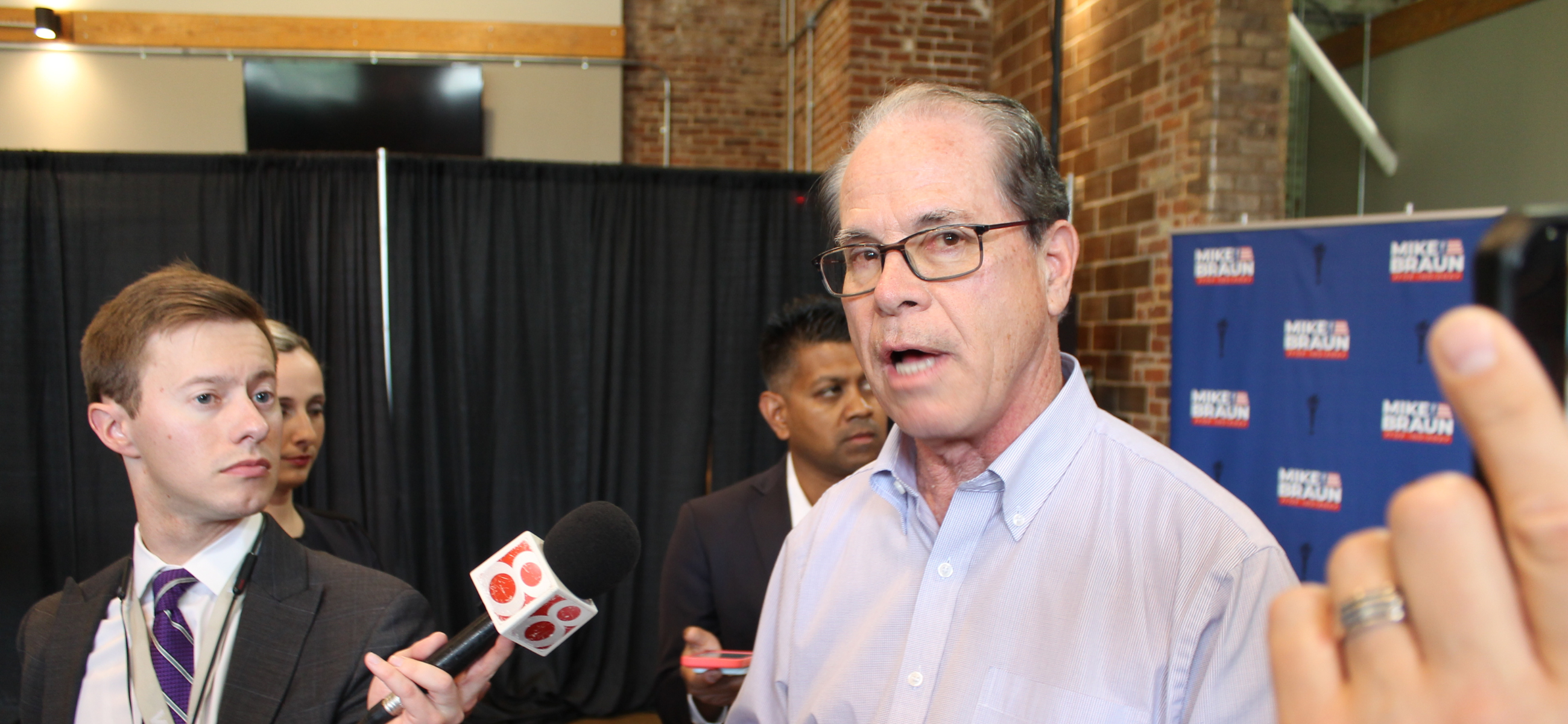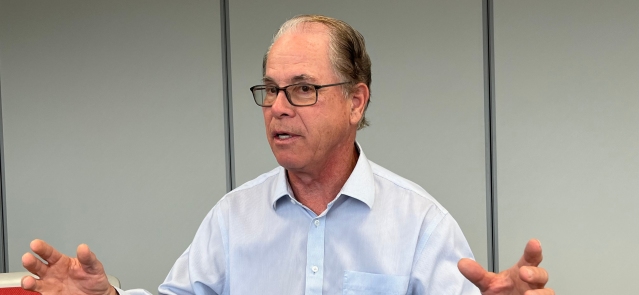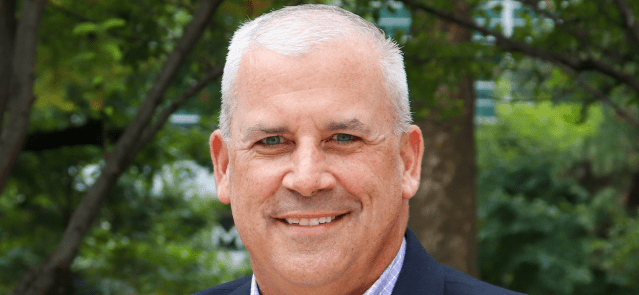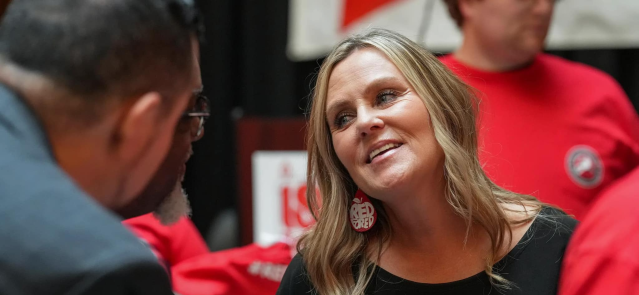Stay ahead of the curve as a political insider with deep policy analysis, daily briefings and policy-shaping tools.
Request a Demo
Mike Braun just before his watch party began on May 7, 2024. (Credit: Jarred Meeks)
- To give farmers relief, Braun wants to cap their annual property tax bill increases
- Plan says Indiana should implement new accountability and transparency safeguards for IEDC
- Braun campaign said it expects to release more policy plans ahead of election
Republican gubernatorial nominee Mike Braun, in partnership with Hoosiers for Opportunity, Prosperity and Enterprise, released on Friday a sprawling agriculture plan detailing policy proposals concerning farmers, rural communities and the Indiana Economic Development Corp.
To give farmers property tax relief, the plan calls for capping their annual property tax bill increases at 3%. Similar to what Braun suggested under his property tax relief proposal, the plan would require that all property tax-related referendums take place in general elections and such ballot language be changed to highlight total proposed levies.
The plan also suggests “modernizing” how farmland is valued by tinkering with the farmland base rate formula — upping the maximum capitalization rate, removing some or all federal payments and ensuring the use of accurate input cost data — to give farmers more relief.
Braun and Hoosiers for Opportunity, Prosperity and Enterprise envision creating farm savings accounts to serve as “rainy day” funds for Hoosier farmers. In addition, they argue for older Hoosiers looking to sell their farms to receive an adjusted gross income tax credit “in exchange for selling or renting their assets to a qualified beginning farmer.”
To aid rural Indiana communities, the plan proposes establishing the Hoosier Rural Business Growth Program to spur the Indiana Economic Development Corp. to attract private sector investors and help rural businesses expand.
In addition, the state should implement new accountability and transparency safeguards for the corporation, the plan said.
“As part of its due diligence process, the State should require IEDC [Indiana Economic Development Corp.] to analyze the impact of its investments on Hoosiers’ utility costs and regional water and energy resource availability,” the plan said. “IEDC would also be directed to study whether new generation, transmission, or distribution capacity would be needed to serve an IEDC project. For any investment that is projected to have a negative impact on ratepayers or electric cooperative member-consumers, IEDC would be required to develop and implement a mitigation plan.”
Regarding child care, the plan advocates for local governments to work with employers to create and sustain needed facilities via a program using a mixture of state funding and a local match. And to improve Indiana’s broadband infrastructure, Indiana should establish a matching grant program similar to the state’s Community Crossings Matching Grant Program for local roads and bridges, the plan said.
Braun’s campaign told State Affairs he would work with the Indiana General Assembly to determine how the programs would be financed.
Among other proposals, the plan would establish a “one-stop” online portal for farmers, giving them easier access to technical support, regulatory updates and funding opportunities. The plan would also build on state lawmakers’ efforts to ban foreign adversaries from owning Hoosier farmland by requiring the countries “to divest of any land holdings” in Indiana and requiring “all foreign agents” to register with the state.
“Among other things, this registration process would include a requirement to disclose the ownership structure of foreign entities, thereby bolstering the State’s detection of Chinese shell companies,” the plan said.
Braun’s plan comes one week after he was noncommittal about additional policy proposals when speaking with reporters. Asked by State Affairs at the Sept. 6 meeting whether he would release additional policy plans, Braun replied, “Remains to be seen.”
The Braun campaign told State Affairs on Friday that it expects to release more policy plans in partnership with Hoosiers for Opportunity, Prosperity and Enterprise, an organization headed by prominent conservative political figures in Indiana, ahead of the election.
The organization’s board consists of attorney James Bopp Jr., Institute for Quality Education President and CEO Betsy Wiley, former state Rep. Daniel Dumezich, longtime alcohol lobbyist Jim Purucker, former state Sen. Scott Schneider, and the board’s president, Ryan Black, according to its website. The organization has paid for TV ads supporting Braun in recent months.
In a written statement to State Affairs, Libertarian candidate Donald Rainwater said, “As with his [Braun’s] property tax proposal, his Agriculture and Rural Plan appears to be not his own, but a plan given to him by someone else. Every voter should wonder if Mike Braun or the board members of Hoosiers for Opportunity, Prosperity, and Enterprise, Inc will be executing the responsibilities of Governor of Indiana should he be elected.”
Democratic gubernatorial nominee Jennifer McCormick’s campaign did not immediately respond to State Affairs’ request for comment.
Contact Jarred Meeks on X @jarredsmeeks or email him at [email protected].
Know the most important news affecting Indiana
Get our free weekly newsletter that covers government, policy and politics that impact your everyday life—in 5 minutes or less.
Braun calls for universal school vouchers in education platform
Republican gubernatorial candidate Mike Braun is backing the removal of all income limits for the state’s private school voucher program as part of his education platform. Braun’s proposals released Tuesday call for targeting pay raises for teachers in “high-need content areas” without specifying any salary goals such as the $60,000 minimum pay level that Democratic …
Indiana cities, towns rep asks for patience on property tax changes
Cutting property taxes has emerged this year as both a gubernatorial campaign issue and a discussion topic for the Indiana General Assembly. But the state’s cities and towns — which derive more than half of their annual budgets from property tax revenue and use it to pay for police officers, firefighters and other key services …
Democrats seek $60,000 minimum salary for teachers
When Jennifer Kaufmann landed her first teaching job, she brought $30,000 in student loan debt with her. “Because of my pay, I was living paycheck to paycheck and had to defer my student loan payments for a while,” said Kaufmann, who now teaches science and social studies at Warren Online Academy in Indianapolis. Most of …
McCormick envisions path to medical, recreational marijuana legalization in Indiana
Democratic gubernatorial nominee Jennifer McCormick wants to allow medical marijuana in Indiana before fully legalizing the drug for adult Hoosiers. McCormick unveiled the latest update to her marijuana plan during a Thursday news conference. If elected governor, McCormick envisions creating a state cannabis commission. She said the independent body would be responsible for overseeing Indiana’s …




